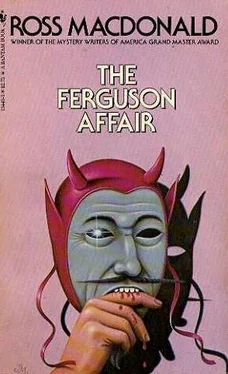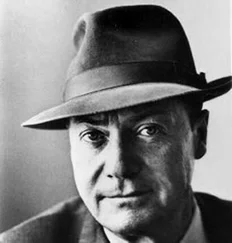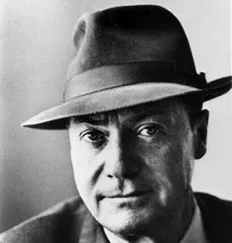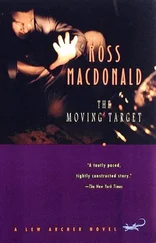“What’s she doing in town?”
“I gather she’s living quietly here with her husband. I only talked to her for a couple of minutes, and then Dr. Trench took me. Dr. Trench said I was in wonderful shape for a woman in her ninth month.”
“Good. Did she mention her husband’s name?”
“No, but I read it in the columns last summer when she got married. I think she married a Canadian oilman. Let’s see, it was some Scotch name-something like Ballantine. Anyway, she seems to have done all right for herself. She was dripping with mink and things.”
“What kind of a woman is she?”
“She seemed nice and down-to-earth for a movie actress. She asked me how long I had to go and such. She’s a stunning creature, but it doesn’t seem to have gone to her head. Why?”
“Nothing special. Her name came up. I had no idea that she was living in town.”
“A lot of people live here that you never hear about.” Sally’s voice changed gears, with a faint ominous clash. “There is, for instance, the unknown housewife whose specialty is leg of lamb. She sits in her modest home awaiting recognition-”
“Are you fixing a leg of lamb?”
“It’s already fixed. With mint jelly. I know it’s an extravagance, Bill, but I wanted to make you something special for a change. I spend so much time dreaming lately, I haven’t been doing my duty by you. You will be home for dinner, won’t you?”
“As soon as I can make it. Keep it warm.”
“But you can’t keep a leg of lamb warm. It dries out. ”
“I enjoy it that way. Like pemmican.”
Sally hung up on me, and there I was again with the adrenalin singing in my veins. I decided to walk it off. Something that was not ESP pushed me down the long slope of Main Street to the lower town.
THERE WAS A POLICE SEAL on the front door of Broadman’s store. I peered through the dusty pane. The evening light fell slanting across the furniture and bric-à-brac which Broadman had laid up against hard times, before time stopped for him.
I became aware of voices next door, a woman’s voice raised high, and a man’s growling under it. I strolled over and looked in through the window of the tamale shop. The man in the white hat was arguing across the counter with a black-haired woman. Her hands gripped the edge of the counter as if it was a high ledge from which she would fall to her death if she let go.
“But they will kill him,” she cried.
“Let them. He asked for it.”
“What will I do if they kill him?”
“You’ll be better off.”
His eyes were brown liquid slits under his white hat. They widened when they saw me through the glass door. I tried it. It was locked.
He shook his head curtly, and waved me away. The movement of his arm was jerky, like a semaphore’s. I pointed at a sign in the window which said: OPEN 7 A.M. TO MIDNIGHT. He came around the counter, opened the door about a foot, and thrust his nose out. His nose was longer and sharper than it had appeared in the afternoon.
“I’m closed, I’m sorry. There’s a good place around the corner on Main Street.” Then he gave me a second look. “Are you a policeman? I saw you with Mr. Granada this afternoon.”
“I’m a lawyer, William Gunnarson. Could I talk to you a little, Mr. Donato?”
“I have already talked about my brother, to the police.”
The woman had crowded up behind him. She was a young pretty woman, but her face was puffed and dissolute with trouble. She said with one hand in her tangled licorice hair:
“Tell him nothing!”
“Be quiet, Secundina. You are a fool.” He turned back to me, trying to control his feelings. Their pressure forced the flesh of his face into stark shapes, like cracked clay. “I see, you have heard that my brother is wanted by the police. You want to offer your services?”
“That wasn’t my idea. I want to talk about your neighbor Broadman. Your ex-neighbor.”
Donato didn’t seem to hear me. “I have no need for a lawyer. I have no money to pay a lawyer.” I guessed he was using me to continue his argument with the woman. “If I had money I would go and buy a nice new rope and hang myself.”
“Liar,” she said. “You have a savings account. And he is your only brother.”
“I am his only brother, too. What has he done for me?”
“He worked for you.”
“He broke dishes. He mopped the floor and left it dirty. But I paid him, I kept you eating.”
“Big shot!” Her mouth curled.
“Gus is the big shot. He throws his weight, and I pick up the pieces. This time there’s one big piece, a dead man. I can’t pick it up.”
“But he is innocent.”
“Like the Devil himself, innocent.”
Her teeth flashed. “Dirty liar, you must not say that.”
“And Gus is the one who tells the truth? I tell you, I am finished with Gus. He’s not my brother. He can live or die, I don’t want to know about it.” He turned to me. “Go away, Mister, eh?”
“Where is your brother?”
“Out in the tules someplace. How do I know? If I knew, I’d go out and bring him in. He took my pickup.”
“He borrowed it,” Mrs. Donato said. “He wants to bring it back. He wants to talk to you.”
“Have you seen him, Mrs. Donato?”
Her face closed up. “I didn’t say that.”
“I must have misunderstood you. Can we go someplace and talk? I have some questions I’d very much like to ask you.”
“What about?”
“People you may have heard of. There’s a man named Larry Gaines, for instance, who works as a lifeguard at the Foothill Club.”
Her eyes became hard and dim and dusty, like the glass eyes you see in deer heads. “I never been there in my life. I don’t know nobody out there.”
“You know Tony Padilla,” her brother-in-law said. He looked at her significantly.
“Who’s he, Mr. Donato?”
“Fellow tends bar at the Foothill Club.”
“What’s he got to do with this?”
“Nothing,” he said impassively. “We don’t, neither. Excuse us now, Mister, how about it? You see what family trouble I got. This is a bad time to visit.”
Gently and firmly, he shut the door in my face.
I took a taxi to the Foothill Club and told the driver not to wait. There was a police Mercury with undercover plates among the Cadillacs and sports cars in the tree-shaded parking lot. I was in no mood to talk to policemen. I leaned against the trunk of one of the trees, as far as possible from the Mercury, and waited for Wills’s detectives to come out.
The mere idea of detectives at the Foothill Club was incongruous. It was one of those monumentally unpretentious places where you could still imagine that the sun had never set on the international set. It cost five thousand dollars to join, and membership was limited to three hundred. Even if you had the five thousand, you had to wait for one of the members to die. And then take a blood test, for blueness.
The members straggling out in twos and threes from the nineteenth hole all looked as if they intended to live forever. Men with hand-polished leather faces who followed the sun from Acapulco to Juan-les-Pins, elderly striding women in sensible shoes complaining in anglicized accents about the price of drinks or the fact that the club was cutting costs on the heating system of the swimming pool.
One of them wondered audibly what had happened to that nice young pool attendant. A silver-haired man in a white scarf said, with some satisfaction, that the fellow had been fired. He’d made one pass too many at you-know-who, but in his opinion, which his voice caressed, the woman was just as much to blame as the lifeguard, what was his name? Too many new faces, slipping standards.
Читать дальше












